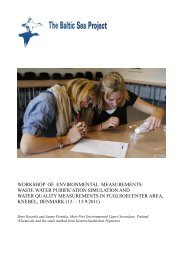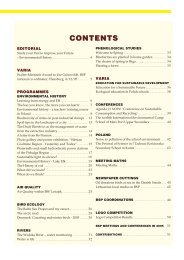newsletter_2008_1.pdf - 5.84 MB - The Baltic Sea Project
newsletter_2008_1.pdf - 5.84 MB - The Baltic Sea Project
newsletter_2008_1.pdf - 5.84 MB - The Baltic Sea Project
Create successful ePaper yourself
Turn your PDF publications into a flip-book with our unique Google optimized e-Paper software.
<strong>The</strong> first<br />
Research<br />
of Nature<br />
I am a teacher of primary classes, and I am always searching<br />
for new ways and methods of teaching my students<br />
various subjects. I want to make my lessons more interesting<br />
and attractive. Last year I was offered the opportunity<br />
to join to the BSP programme. Because I work with<br />
primary classes, I decided to choose Phenological studies.<br />
Last spring our class enjoyed doing the BSP programme in<br />
Phenological studies.<br />
<strong>The</strong> primary goals were to promote love for nature, to<br />
make lessons untraditional and more interesting, and to<br />
improve knowledge not only of nature but also of English.<br />
I was quite pleased with the results. My students enjoyed<br />
observing nature. <strong>The</strong>y found learning more interesting<br />
and it increased their motivation to learn. It was also very<br />
useful for me. I had a possibility to integrate a lot of subjects<br />
and to attract my students to learning.<br />
We live in the territory of the Rambynas Regional Park.<br />
<strong>The</strong>re are 703 different species of plants and 206 species of<br />
birds registered in the park. <strong>The</strong>re is a large colony of white<br />
storks that has settled in a small pinewood forest near the<br />
Nemunas River. Some white storks made their nest on the<br />
roof of our school. It was therefore not very difficult for us<br />
to see the first white storks. We are waiting for them this<br />
spring too.<br />
<strong>The</strong> BSP was a great opportunity for us to become<br />
acquainted with many species of plants and birds known<br />
only from TV and handbooks. We searched and found out<br />
about the appearance, manner and behaviour of the birds<br />
of Lithuania. This project gave us the opportunity to have<br />
a lot of interesting lessons and walks in nature. We became<br />
closer to it.<br />
<strong>The</strong> students are improving their English too; they keep<br />
notes in which the results of their observations are<br />
recorded. Some English words are interesting and funny<br />
for students, for example, cuckoo, snowdrop, etc.<br />
My students have already felt the excitement of researching<br />
nature, and I am sure that what they learn now will<br />
remain in their hearts forever.<br />
Ligita Kazlauskienė<br />
Teacher<br />
E-mail: ligita-kazlausk@one.lt<br />
Students of 4th class<br />
Vilkyškiai Secondary School, Vilkyškiai, 99254,<br />
Pagėgiai Local Goverment, Lithuania<br />
E-mail: vilkyskiu_vidm@takas.lt<br />
ExPERIEncE<br />
Photos: authors<br />
27





